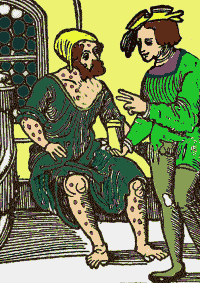Meet the Middle Ages
BackIllness

People in the Middle Ages fell ill, just as we do. However, they did not have much knowledge about how diseases were spread or why you became ill. Some people knew about how to cure or lessen the effects of illness by using medicine or herbs.
Small children were particularly sensitive - if they fell ill they often died. Older children had the same accidents as children do today: drowning, burns, cuts and so on. Men had accidents at work; on the farm or in the workshop. Women were at great risk every time they gave birth. In addition, the plague swept through the countries a number of times during the Middle Ages. Illness was seen as something evil which from time to time overtook people. Sometimes, illness was seen as an evil spirit or demon which had taken possession of the body.
People did their best to avoid disease. New-born babies were thought to be especially vulnerable to evil powers. To protect them, one put a piece of steel in the cradle. A Christian cross was also thought to be protective, as well as a small bag of amulets worn around the neck. By regularly letting one ´s blood, one believed one could stay healthy.
Monks and nuns knew quite a lot about medical treatment. They knew which herbs and plants to use to cure an illness, or to make it less severe. They also knew how to heal a broken arm or leg.
Wise women, or blood-letters tried to cure illness by means of potions or chants. The medicines were supposed to have a bad taste in order to help. Blood, urine or manure were often used in these remedies. People in the Middle Ages had no knowledge of how diseases were spread. They noticed that sick people often had a bad breath or a nasty smell. Therefore, they thought that it was a good thing to use pleasant scents, or burning sulphur to cleanse the air. This was very much done when the Black Death raged.
Another way to get your health back, was to pray to God or a special saint. Through prayers, the sick could get well again.